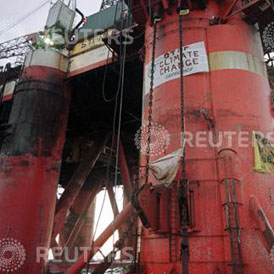£4.5bn Shetland oil plan gets go-ahead
David Cameron has given BP permission to begin a new £4.5bn oil project west of the Shetland Islands. BP says the investment will end a “decade of decline” in the industry.
The BP-run scheme is an extension of the existing Clair oil field, to the west of the Shetland Islands in northern Scotland. It is part of £10bn being spent on four projects by BP, Shell, Chevron and ConocoPhillips over the next five years.
The projects are expected to provide 3,000 jobs as well as sustaining the 3,500 jobs that already exist in BPs North Sea operations.
BP Chief Executive Bob Dudley said: “Although it began over 40 years ago, the story of the North Sea oil industry has a long way yet to run.
“BP has produced some 5 billion barrels of oil and gas equivalent so far from the region and we believe we have the potential for over three billion more.”
He said the new deal would help boost production: “After some years of decline, we now see the potential to maintain our production from the North Sea at around 200,000 to 250,000 barrels of oil equivalent a day until 2030.”
David Cameron said the Clair Ridge project would provide: “a massive boost for jobs and growth”. Addressing workers at BP’s headquarters, Mr Cameron said: “I remember being told in the classroom that by the turn of the century the North Sea oil will be over.

“All the oil will be gone. If you think you’ve recovered 40 billion barrels there’s probably another 20 billion… to go. So you’re two-thirds of the way through.”
Aberdeen-based BP operates around 40 oil and gas fields, four onshore terminals and a network of pipelines that transport almost half of the UK’s oil and gas production.
Environmental concerns
Mr Cameron also used his speech signalled support for more deep-water drilling around UK waters. BP wants to start drilling a new exploratory well near the Shetlands next year.
The project has been opposed by the environmental campaign group Greenpeace, who lobbied Energy Secretary Chris Huhne to refuse to approve the plans.
Four of Britain’s biggest green groups are joining forces to warn that any spill would pose a “significant risk to wildlife”. In a joint letter to Chris Huhne, Greenpeace, the Royal Society for the Protection of Birds, the WWF and Friends of the Earth said that none of them had been involved in BP’s public consultation exercise about the well, which ended last week.